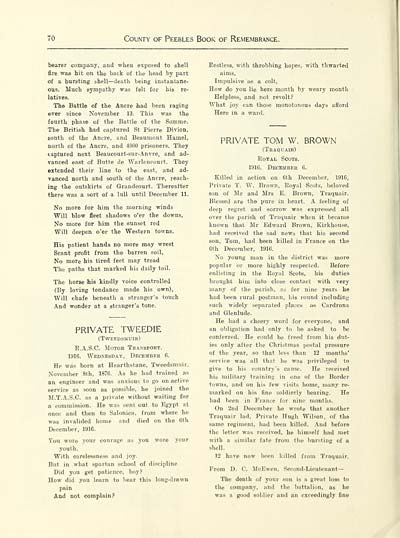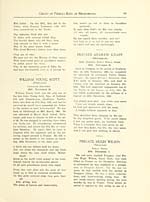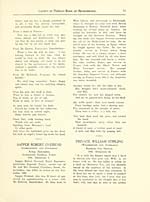Download files
Complete book:
Individual page:
Thumbnail gallery: Grid view | List view

70
County of Peebles Book of Remembrance.
bearer company, and wlieu exposed to shell
fire was hit on the back of the head by part
of a bursting shell — death being instantane-
ous. Much sympathy was felt for his re-
latives.
The Battle of the Ancre had been raging
ever since November 13. This was the
fourth phase of the Battle of the Somme.
The British had captured St Pierr© Divion,
south of the Ancre, and Beaumont Hamel,
north of the Ancre, and 4000 prisoners. They
captured next Beaucourt-sur-Anvre, and ad-
vanced east of Butte de Warlencourt. They
extended their line to the east, and ad-
vanced north and south of the Ancre, reach-
ing the outskirts of Grandcourt. Thereafter
there was a sort of a lull until December 11.
No more for liim the morning winds
Will blow fleet shadows o'er the downs.
No more for him the sunset red
Will deepen o'er the Western towns.
His patient hands no more may wrest
Scant profit from the barren soil.
No more his tired feet may tread
The paths that marked his daily toil.
The horse his kindly voice controlled
(By loving tendance made his own),
Will chafe beneath a stranger's touch
And wonder at a stranger's tone.
Eestless, with tlhrobbing hopes, with thwarted
aims.
Impulsive as a colt,
How do you lie here month by weary month
Helpless, and not revolt?
What joy can those monotonous days afford
Here in a ward.
PRIVATE TWEEDIE
(Tweedsmuir)
R.A.S.C. MoTOE Transport.
1916. Wednesday, December 6.
He was born at Hearthstane, Tweedsmuir,
November 8th, 1876. As he had trained as
an engineer and wais anxious to go on active
service as soon as possible, he joined tho
M.T..\.H.C. as a private without waiting for
a commission. He was sent out to Egypt at
once and then to Salonica, from where he
was invalided home and died on the 6th
December, 191C.
You wore your couiuge as you wore your
youth,
With oarelessnes« and joy.
But in wliat spartan school of discipline
Did you get patience, boy?
How did .you learn to bear this long-drawn
pain
Anil not complain?
PRIVATE TOM W. BROWN
(Tbaquair)
EoTAL Scots.
191G. December 6.
Killetl in action on 6th December, 1916,
Private T. W. Brown, Eoyal Scots, beloved
son of Mr and Mrs E. Brown, Traquair.
Blessed ar© the pure in heart. A feeling of
deep regret and sorrow was expressed all
over the parish of Traquair when it became
known that Mr Edward Brown, Kirkhoiise,
had received the sad news that his second
son, Tom, had been killed in France on the
6th December, 1916.
No young man in the district was more
popular or more highly respected. Before
enlisting in the Royal Scots, his duties
brought him into close contact with very
many of the parish, as for nine years he
had been rural postman, liis round including
such widely separated places as Cardrona
and Glenlude.
He had a cheery word for everyone, and
an obligation had only to be asked to be
conferred. He coTild be freed from his dut-
ies only after the Christmas postal pressure
of the year, so that less than 12 months'
service was all that he was privileged to
give to his country's cause. He received
his military training in one of the Border
towns, and on his few visits home, many l^e-
marked on his fine soldierly bearing. He
had been in France for nine months.
On 2nd December he wrote tihat another
Traquair lad, Private Hugh AVilson, of the
same regiment, had been killed. And before
the letter was received, he himself liad met
with a similar fate from th(v Inirsting of a
shell.
12 have now beon killed from 'I'rnquair.
From D. C. McEwen, Second-Lieutpnant —
The death of your son is a great loss to
the company, and the battalion, as he
was a good soldier and an exceedingly fine
County of Peebles Book of Remembrance.
bearer company, and wlieu exposed to shell
fire was hit on the back of the head by part
of a bursting shell — death being instantane-
ous. Much sympathy was felt for his re-
latives.
The Battle of the Ancre had been raging
ever since November 13. This was the
fourth phase of the Battle of the Somme.
The British had captured St Pierr© Divion,
south of the Ancre, and Beaumont Hamel,
north of the Ancre, and 4000 prisoners. They
captured next Beaucourt-sur-Anvre, and ad-
vanced east of Butte de Warlencourt. They
extended their line to the east, and ad-
vanced north and south of the Ancre, reach-
ing the outskirts of Grandcourt. Thereafter
there was a sort of a lull until December 11.
No more for liim the morning winds
Will blow fleet shadows o'er the downs.
No more for him the sunset red
Will deepen o'er the Western towns.
His patient hands no more may wrest
Scant profit from the barren soil.
No more his tired feet may tread
The paths that marked his daily toil.
The horse his kindly voice controlled
(By loving tendance made his own),
Will chafe beneath a stranger's touch
And wonder at a stranger's tone.
Eestless, with tlhrobbing hopes, with thwarted
aims.
Impulsive as a colt,
How do you lie here month by weary month
Helpless, and not revolt?
What joy can those monotonous days afford
Here in a ward.
PRIVATE TWEEDIE
(Tweedsmuir)
R.A.S.C. MoTOE Transport.
1916. Wednesday, December 6.
He was born at Hearthstane, Tweedsmuir,
November 8th, 1876. As he had trained as
an engineer and wais anxious to go on active
service as soon as possible, he joined tho
M.T..\.H.C. as a private without waiting for
a commission. He was sent out to Egypt at
once and then to Salonica, from where he
was invalided home and died on the 6th
December, 191C.
You wore your couiuge as you wore your
youth,
With oarelessnes« and joy.
But in wliat spartan school of discipline
Did you get patience, boy?
How did .you learn to bear this long-drawn
pain
Anil not complain?
PRIVATE TOM W. BROWN
(Tbaquair)
EoTAL Scots.
191G. December 6.
Killetl in action on 6th December, 1916,
Private T. W. Brown, Eoyal Scots, beloved
son of Mr and Mrs E. Brown, Traquair.
Blessed ar© the pure in heart. A feeling of
deep regret and sorrow was expressed all
over the parish of Traquair when it became
known that Mr Edward Brown, Kirkhoiise,
had received the sad news that his second
son, Tom, had been killed in France on the
6th December, 1916.
No young man in the district was more
popular or more highly respected. Before
enlisting in the Royal Scots, his duties
brought him into close contact with very
many of the parish, as for nine years he
had been rural postman, liis round including
such widely separated places as Cardrona
and Glenlude.
He had a cheery word for everyone, and
an obligation had only to be asked to be
conferred. He coTild be freed from his dut-
ies only after the Christmas postal pressure
of the year, so that less than 12 months'
service was all that he was privileged to
give to his country's cause. He received
his military training in one of the Border
towns, and on his few visits home, many l^e-
marked on his fine soldierly bearing. He
had been in France for nine months.
On 2nd December he wrote tihat another
Traquair lad, Private Hugh AVilson, of the
same regiment, had been killed. And before
the letter was received, he himself liad met
with a similar fate from th(v Inirsting of a
shell.
12 have now beon killed from 'I'rnquair.
From D. C. McEwen, Second-Lieutpnant —
The death of your son is a great loss to
the company, and the battalion, as he
was a good soldier and an exceedingly fine
Set display mode to: Large image | Transcription
Images and transcriptions on this page, including medium image downloads, may be used under the Creative Commons Attribution 4.0 International Licence unless otherwise stated. ![]()
| Rolls of honour > Places > Book of remembrance for Tweeddale > Landward Parishes > (118) |
|---|
| Permanent URL | https://digital.nls.uk/101151497 |
|---|
| Attribution and copyright: |
|
|---|---|
| Description | Arranged alphabetically by first-named place, starting with Aberdeen. |
|---|

